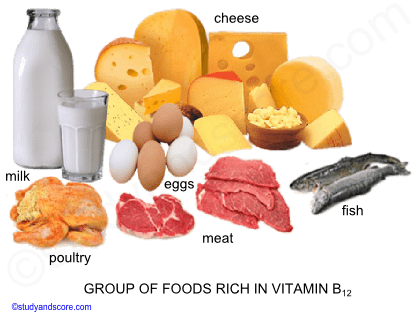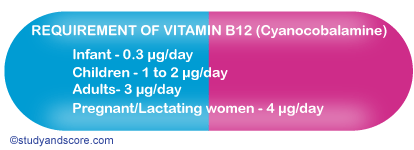Vitamin B12 was discovered in 1926 by Georg Richard Minot and William Parry Murphy. They found that eating large quantities of liver restored red blood cells in patients with pernicious anaemia. In 1934, they won Nobel Prize for their work in treatment of pernicious anaemia.
Structurally vitamin B12 is the most complex of all the vitamins. It consists of,
Though the corrin ring is similar to the porphyrin ring of chlorophyll and cytochrome, it has two directly boned pyrrole rings. The central atom in the corrin ring is Cobalt. Four of the six coordinations are provided by the corrin ring nitrogen atoms. Fifth coordination is provided by dimethylbenzimidazole group. The sixth coordination partner is a cyano group (-CN), a hydroxyl group (-OH), a methyl group (-CH₃) / 5'-deoxyadenosyl group respectively. The covalent C-Co bond is the only carbon-metal bond known in biology.
Sources of vitamin B 12 include milk, eggs, cheese, meat, fish and poultry. Plants do not supply any vitamin B12; hence exclusive vegetarian diet for a long period of time will lead to vitamin B12 deficiency.

The estimation for the requirement of vitamin B12 requirement is based on its amounts required to maintain normal RBC maturation in patients with pernicious anemia. It is secreted in bile and reabsorbed in small intestine.
 The patients with defective secretion of intrinsic factor cannot re-absorb this vitamin and so it is excreted in the feces. Consequently, patients with impaired secretion of intrinsic factor have much higher requirement for vitamin B12 than normal.
The patients with defective secretion of intrinsic factor cannot re-absorb this vitamin and so it is excreted in the feces. Consequently, patients with impaired secretion of intrinsic factor have much higher requirement for vitamin B12 than normal.
A factor called “Intrinsic Factor” (IF) secreted by the stomach is essential for the absorption of vitamin B12 from the intestines. Cyanocobalamin is stored in good amounts in the liver.
The deficiency of vitamin B12 results in a condition called as pernicious anemia, a genetic defect. Since vitamin B12 is important for the maturation of RBCs (red blood cells), the deficiency of this vitamin leads to the formation of macrocytic RBCs.
Of all vitamins, vitamin B12 is the most complex. The trace mineral cobalt is an essential part of the molecule. This vitamin is required for the maturation of RBCs in the bone marrow and also for the synthesis of proteins.
- Share with your friends! -
Login to post your comment here...
- or with social Account -